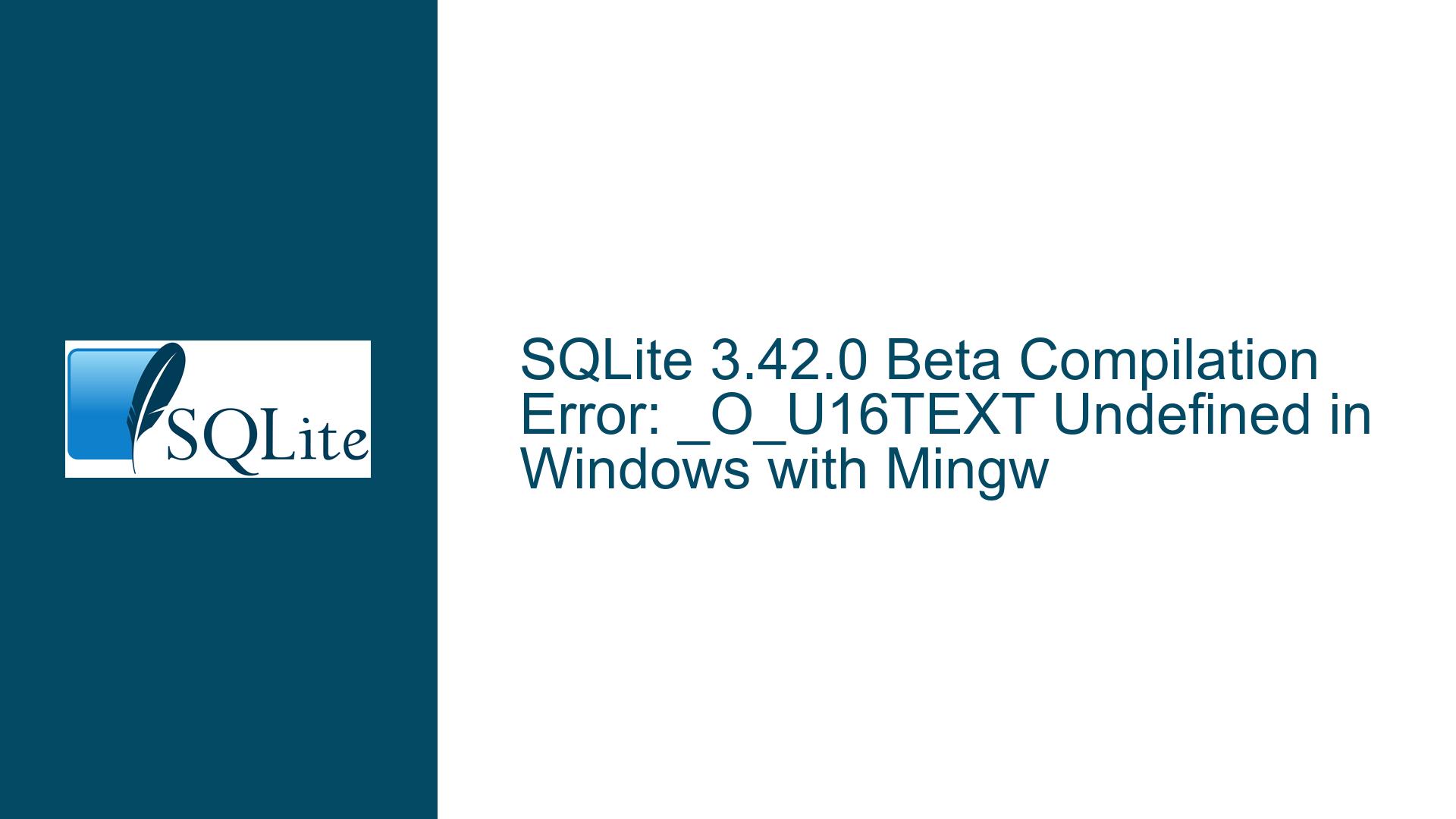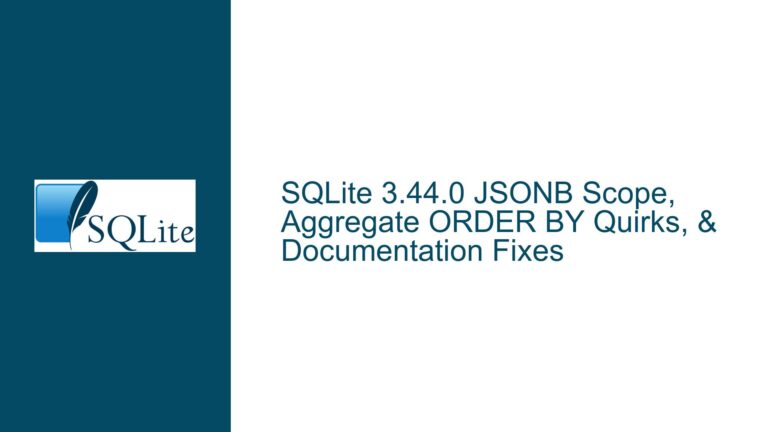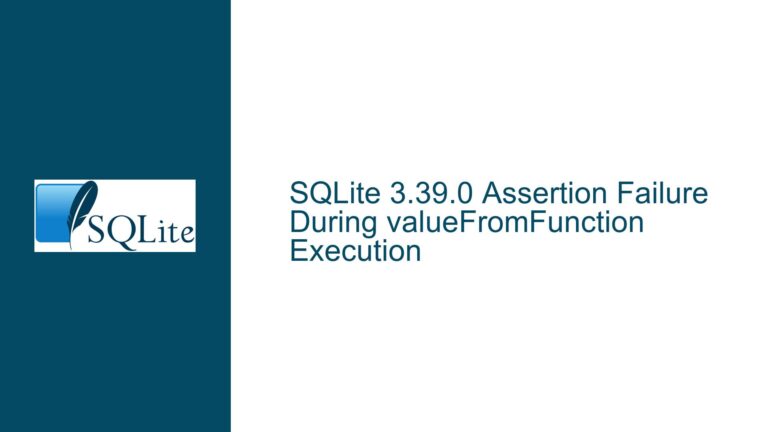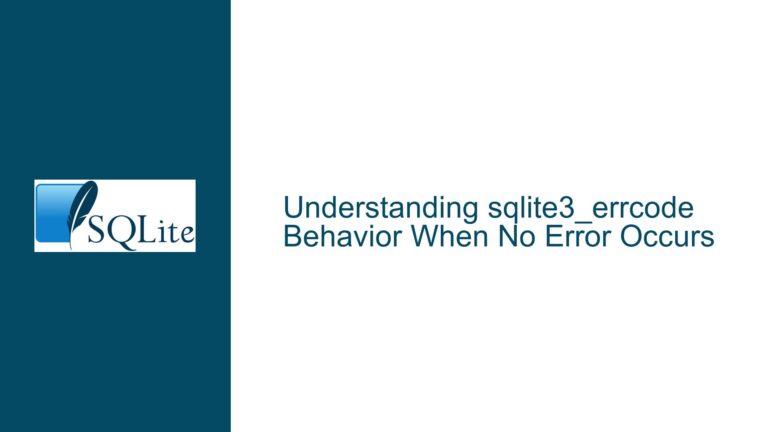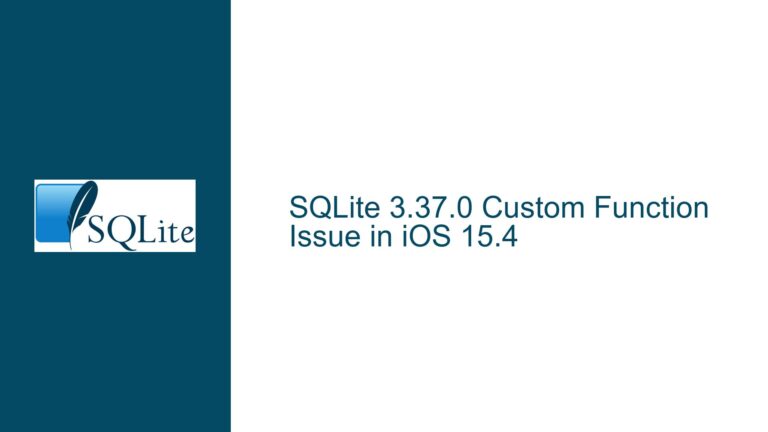SQLite 3.42.0 Beta Compilation Error: _O_U16TEXT Undefined in Windows with Mingw
Issue Overview: Compilation Error Due to Undefined _O_U16TEXT in SQLite 3.42.0 Beta on Windows with Mingw
The core issue revolves around a compilation error encountered when attempting to build the SQLite 3.42.0 beta version on a Windows system using an older version of the Mingw compiler. Specifically, the error occurs in the shell.c file within the console_prepare function. The compiler reports that _O_U16TEXT is undeclared, suggesting that the constant is not recognized by the older Mingw environment. This constant is crucial for setting the input mode of the console to handle UTF-16 encoded text, which is a feature introduced in more recent versions of the Windows API.
The error message indicates that the compiler is unable to find the definition for _O_U16TEXT, which is typically defined in the fcntl.h header file. This header file is part of the C standard library and is responsible for defining various file control options. The absence of this definition suggests that the Mingw environment being used is either outdated or lacks the necessary updates to support this feature. The error is particularly problematic because it prevents the successful compilation of the SQLite shell, which is a critical component for interacting with SQLite databases.
The issue is further compounded by the fact that the project in question is an older internal project, which implies that upgrading the development environment might not be a straightforward task. The user has indicated that they are using Mingw version 9.2.0, which is relatively old, and the associated header files (mingwrt533\include, win32api533) are also outdated. This suggests that the development environment has not been updated in some time, and as a result, it lacks support for newer features such as _O_U16TEXT.
The user has also referenced a Stack Overflow post from 11 years ago, which suggests a workaround involving the use of the actual values of the constants instead of their symbolic names. This workaround involves replacing _O_U16TEXT with its hexadecimal value 0x00020000. While this approach might resolve the immediate compilation error, it is not a long-term solution and could lead to maintenance challenges, especially if the code needs to be ported to different environments or updated in the future.
Possible Causes: Outdated Mingw Environment and Missing Definitions in Header Files
The primary cause of the compilation error is the outdated Mingw environment being used for the build process. Mingw, which stands for "Minimalist GNU for Windows," is a development environment that allows developers to compile and build Windows applications using the GNU Compiler Collection (GCC). However, like any software, Mingw requires periodic updates to support new features and standards. In this case, the Mingw environment being used is version 9.2.0, which is several years old and does not include the necessary definitions for _O_U16TEXT.
The _O_U16TEXT constant is part of the Windows API and is used to set the input mode of the console to handle UTF-16 encoded text. This feature was introduced in more recent versions of the Windows API, and as such, it is not available in older versions of Mingw. The absence of this constant in the fcntl.h header file is the direct cause of the compilation error. The header file is responsible for defining various file control options, and without the definition for _O_U16TEXT, the compiler is unable to proceed with the build.
Another potential cause of the issue is the use of an older version of the Windows API. The user has indicated that they are using win32api533, which is an older version of the Windows API. This version of the API may not include the necessary definitions for _O_U16TEXT, further contributing to the compilation error. The Windows API is constantly evolving, and newer versions introduce new features and constants that are not available in older versions. As a result, developers who are working with older versions of the API may encounter issues when trying to compile code that relies on newer features.
The issue is also related to the fact that the SQLite 3.42.0 beta version includes new features that rely on more recent versions of the Windows API. The console_prepare function in the shell.c file is designed to set the input mode of the console to handle UTF-16 encoded text, which is a feature that is not available in older versions of the Windows API. As a result, when the code is compiled using an older version of Mingw, the compiler is unable to find the necessary definitions, leading to the compilation error.
Troubleshooting Steps, Solutions & Fixes: Upgrading Mingw, Defining Constants, and Omitting Unnecessary Features
The first and most straightforward solution to the compilation error is to upgrade the Mingw environment to a more recent version. This would ensure that the necessary definitions for _O_U16TEXT are available in the fcntl.h header file. Upgrading Mingw would also provide access to other new features and improvements that have been introduced in more recent versions of the Windows API. However, upgrading the development environment may not always be feasible, especially if the project is large and complex, and upgrading could introduce new issues or require significant changes to the codebase.
If upgrading Mingw is not an option, the next best solution is to define the _O_U16TEXT constant manually. This can be done by adding a preprocessor definition to the compile step. Specifically, the -D_O_U16TEXT=0x20000 flag can be added to the compile command. This flag tells the compiler to define _O_U16TEXT with the value 0x20000, which is the hexadecimal value of the constant. This approach effectively bypasses the need for the constant to be defined in the fcntl.h header file, allowing the code to compile successfully.
For example, if you are using a makefile to build the project, you can add the following line to the makefile:
OPTS=-D_O_U16TEXT=0x20000
This line defines the OPTS variable, which can then be passed to the compiler as part of the compile command. The -D flag is used to define a macro, and in this case, it defines _O_U16TEXT with the value 0x20000. This approach is simple and effective, but it does have some drawbacks. Specifically, it requires manual intervention and may not be suitable for all development environments.
Another option is to define the _O_U16TEXT constant in a custom header file and include that file in the build process. This can be done by defining the SQLITE_CUSTOM_INCLUDE macro to point to the custom header file. The custom header file should contain the following code:
#ifndef _O_U16TEXT
#define _O_U16TEXT 0x20000
#endif
This code checks if _O_U16TEXT is already defined, and if not, it defines it with the value 0x20000. This approach is more flexible than manually adding the definition to the compile command, as it allows the definition to be included in the build process without modifying the makefile or compile command. However, it does require creating and maintaining a custom header file, which may not be ideal for all projects.
If the feature that uses _O_U16TEXT is not needed, another option is to omit it from the build process entirely. This can be done by defining the SHELL_OMIT_WIN_UTF8 macro during compilation. This macro tells the SQLite build system to exclude the code that relies on _O_U16TEXT, effectively bypassing the compilation error. This approach is useful if the feature is not required for the project, as it simplifies the build process and avoids the need for manual definitions or upgrades.
For example, you can add the following line to the makefile:
OPTS=-DSHELL_OMIT_WIN_UTF8
This line defines the SHELL_OMIT_WIN_UTF8 macro, which tells the SQLite build system to exclude the code that relies on _O_U16TEXT. This approach is simple and effective, but it does have the drawback of removing a potentially useful feature from the SQLite shell.
In conclusion, the compilation error caused by the undefined _O_U16TEXT constant in the SQLite 3.42.0 beta version can be resolved through several approaches. The most straightforward solution is to upgrade the Mingw environment to a more recent version, which would provide the necessary definitions for _O_U16TEXT. If upgrading is not feasible, the constant can be defined manually using the -D flag or a custom header file. Alternatively, the feature that relies on _O_U16TEXT can be omitted from the build process by defining the SHELL_OMIT_WIN_UTF8 macro. Each of these solutions has its own advantages and drawbacks, and the best approach will depend on the specific requirements and constraints of the project.
